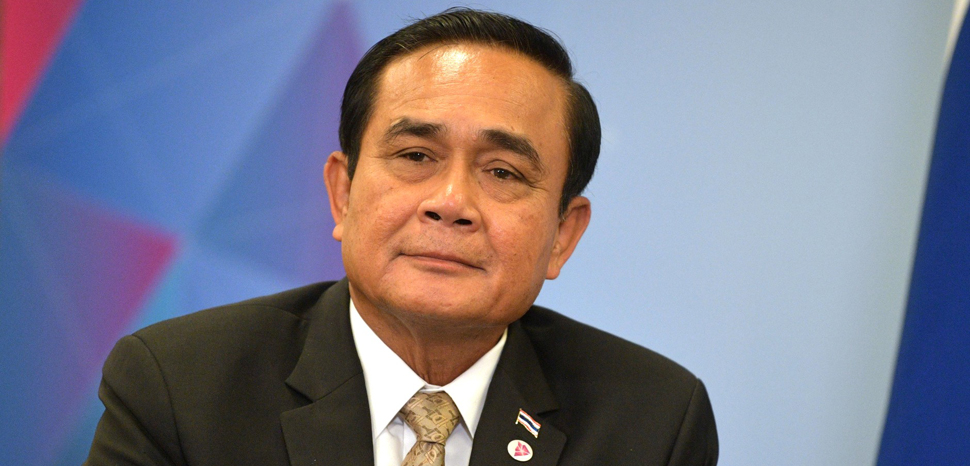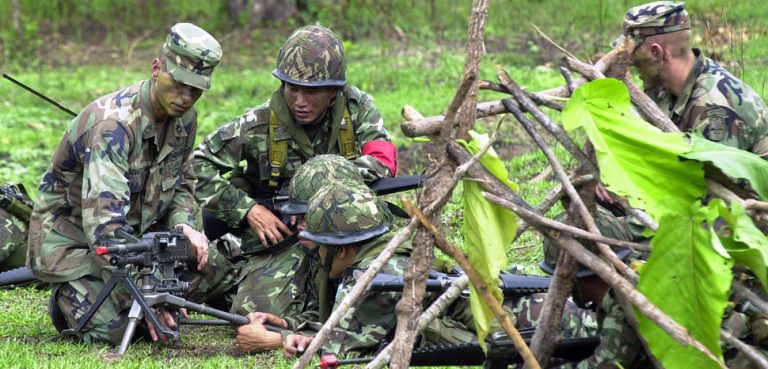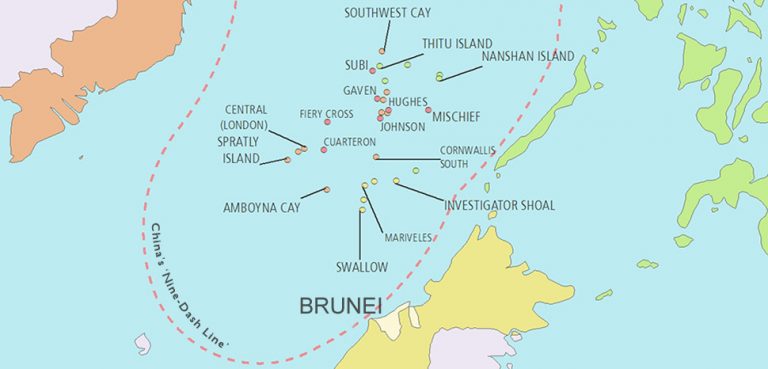The shock return to power of political veteran Mahathir Mohamad in Kuala Lumpur last May signaled not only a new dawn for Malaysia, but also fresh hope of a peaceful resolution to a decades-old conflict raging across the border in southern Thailand. The 93-year-old Mahathir, returning for a second stint as Malaysia’s prime minister, has long held an interest in securing peace in Thailand’s troubled Deep South, where separatist Muslim insurgents have fought the military for independence since the 1950s.
After a high-level meeting in Bangkok last October between Mahathir and the head of Thailand’s ruling military junta, Gen. Prayut Chan-ocha, both sides appointed new peace envoys and initial talks began in January. The early signs were remarkably positive. Thailand, for the first time, voiced a willingness to consider making concessions on autonomy and political decentralization, while indicating a desire to bring the most powerful rebel group, Barisan Revolusi Nasional (BRN), back to the negotiating table.
Yet the fleeting peace process hit an unexpected snag earlier this month, when the head of the Thai negotiating team, retired army general Udomchai Thammasarorat, failed to turn up for a scheduled meeting in the Malaysian capital. The no-show left Malaysian mediator Abdul Rahim Noor ‘shocked,’ and drew an angry response from rebel groups. Mara Patani, an umbrella organization representing a series of rebel factions, responded by ruling-out further participation until after Thai national elections are held in late March, while the rogue BRN vowed to continue its armed struggle for independence.
With support from Malaysia assured, can southern Thailand’s fractured peace process overcome this early setback and – with elections looming – navigate the choppy political waters which may lie ahead?
The roots of southern Thailand’s separatist insurgency
For seven decades, ethnic Malay Muslim separatist rebels have battled Thai security forces to establish an independent homeland in the four southern provinces of Pattani, Yala, Narathiwat, and Songkhla. The conflict-stricken region borders Muslim-majority Malaysia to the south, and was formerly part of the Islamic Sultanate of Patani, which was formed in 1516 and bordered the ancient kingdom of Siam to the north, which would later become modern-day Thailand. The region was annexed in the Anglo-Siamese Treaty of 1909 and incorporated into the Buddhist-majority Thai state, governed by Bangkok.
The region retained its local traditions and largely failed to assimilate with the rest of Thailand, leading to disenfranchisement among many residents and tensions over territorial control of the four southern provinces. By the late 1950s, a political independence campaign had been superseded by an emerging armed insurgency. For decades the conflict remained at a low-level until its intensification in 2004. During the past 15 years more than 7,000 people have been killed amid insurgent bombings, shootings, and assassinations, while the military has launched repeated crackdowns on rebel activity.
Peace talks started in 2015, a year after the Prayut-commanded military junta – formally labelled the National Council for Peace and Order (NCPO) – seized power from the democratically-elected regime of Yingluck Shinawatra in a bloodless coup. Yet negotiations have failed to make meaningful progress. The junta has initiated dialogue with the Mara Patani umbrella grouping, which represents a network of shadowy rebel units operating in the Deep South. Talks have been restricted because the BRN – the most powerful and influential rebel group, which controls most fighters on the ground – has declined to participate in the peace process due to the government’s refusal to allow international mediation. The junta views the conflict as an internal and domestic matter which should not be internationalized.
Another more deeply-ingrained sticking point concerns the rebels’ demand for independence. While the junta and all previous Bangkok administrations have maintained a blunt, non-negotiable position opposed to allowing the south to break away, the junta has also until-recently refused to consider granting autonomy or any kind of political devolution to the south, reflecting the military’s long-term preoccupation with preserving the territorial integrity of the state.
Malaysia’s Mahathir reinvigorates the peace process
Talks remained stalled until the shock election victory of Mahathir in mid-2018. Thailand and Malaysia have long enjoyed strong bilateral ties, while Mahathir’s return – as a respected elder statesman in Southeast Asia with a strong personal interest in regional peace-making – lent fresh impetus to the peace process. Malaysia also has a long-standing interest in helping to resolve the conflict for several vital geo-strategic reasons. Kuala Lumpur feels a sense of duty to ensure an environment of peace and prosperity for ethnic Malay Muslims living in southern Thailand, while also wanting to avoid worsening instability and violence along its northern border, which could result in unmanageable refugee flows. Concerns over the suspected presence of ISIS sympathizers in Malaysia and the potential for weapons to be smuggled via rebels operating in Thailand’s volatile south have also incentivized Malaysia to act.
When Mahathir met Gen. Prayut in late-2018, both leaders were optimistic in tone, and spoke of their shared desire to resolve the conflict. Mahathir pledged to help ‘in whatever way possible to end this violence in the south,’ calling for better co-operation on the issue ‘between two friendly neighbors.’ Gen. Prayut said although the insurgency is considered a ‘domestic problem,’ dialogue would ‘resume immediately with Malaysia as the facilitator,’ without giving a specific timeline for fresh negotiations.
After the appointment of representatives for both countries, initial meetings were held at the start of January. Early indications were positive. Malaysian facilitator Abdul Rahim Noor said he was optimistic the conflict could end within two years, while Thai negotiator Udomchai Thammasarorat said Bangkok would consider devolving powers or allowing a ‘special administrative zone,’ having taken advice from Mahathir. However, it was stated that independence or separation would remain off the table. On 11 January, Udomchai confirmed ‘low-level’ talks had been held with ‘all groups’ involved in the process.
Yet just weeks later, the peace process stands on the brink of collapse after Udomchai failed to attend an introductory meeting with Mara Patani representatives scheduled for 4 February in Kuala Lumpur. The move took the Malaysian facilitating team by surprise and drew an angry reaction from the rebel leadership. Udomchai claimed he would only meet Mara Patani chief Sukree Haree one-on-one, and had never agreed to the pre-arranged meeting with a larger rebel delegation. A Mara Patani statement condemned the Thai panel’s ‘unacceptable attitude’ and ‘hidden agenda,’ calling for Udomchai to be replaced by someone with ‘more credibility.’ Mara Patani has now suspended its participation in talks until after the Thai national election, set for 24 March. The BRN had already rejected involvement and released a video message in early-January, which vowed to ‘fight with all our might’ for independence.
Little over a month in, talks have ended and the revived peace process already stands at a crossroads.
Can the peace process outride upcoming hurdles?
The most immediate obstacle facing the peace process is the upcoming Thai election, set for March. The election has been pushed back repeatedly since the junta came to power in 2014, and may bring a return to democratic governance for the first time in five years. A return to democracy would leave things in the south uncertain: talks would likely be reset and the Thai negotiating team would change, while a new government in Bangkok would have more immediate priorities, such as securing its grip on power after half-a-decade of military rule. Malaysia is also due to undergo a leadership transition, with Mahathir having pledged to give way to successor Anwar Ibrahim within the next few years. This is likely to be a smooth change and would have only a minimal effect on the peace process. However, the charismatic Mahathir, who has invested much time and energy in the process, would be a big loss.
If the Thai junta does stay in power, it remains to be seen whether autonomy will remain on the table. The junta has recently, for the first time, demonstrated a willingness to make concessions and devolve power to some degree, but after the election may revert to its previous policy of initiating a low-key and slow-moving peace dialogue while at the same time hoping to see the insurgency fizzle out on the ground. In this sense, the junta sees the conflict as a low-level nuisance, isolated and confined to the remote southern provinces, rather than as a conflict representing a major threat to national security.
It would certainly suit the next Thai government – whether civilian-led or military-controlled – for the insurgency to die out without the need for talks. Evidence does suggest violence has declined in recent years, with monitoring group Deep South Watch reporting 218 deaths in 2018, down from 235 in 2017 and 892 at the conflict’s peak in 2007. Yet insurgent groups have been resilient enough to persist for decades, while a spate of attacks in early-2019 suggests the security situation may be deteriorating once again. Insurgent groups certainly retain the ability to inflict harm. On 21 January, rebels shot dead two monks at a Buddhist temple in Narathiwat, while other attacks have targeted school guards and policemen.
Some have even raised concerns over ISIS infiltration, as has been witnessed in other conflict zones in Southeast Asia. In 2017, ISIS-aligned militants laid siege to the southern Philippine city of Marawi for five months, and retain a presence in the country after joining-up with local Muslim insurgent groups. However, there has to-date been no documented evidence of ISIS fighters in southern Thailand, while throughout its history the conflict has remained purely separatist and ethno-nationalist in nature. It is unlikely the BRN or Mara Patani would risk accepting ISIS recruits into their ranks, as adopting a violent jihadist ideology would erode local support among moderate Muslims and encourage a firmer military crackdown in the region, supported by global actors. Aside from lingering fears of ISIS infiltration, the prospect of further civilian suffering and impoverishment due to the insurgency persisting in its existing separatist form may yet serve as a strong enough imperative for both sides to seek a political solution.
Future forecast: is autonomy a realistic solution?
If the peace process survives the expected turbulence of the next few months, the process is likely to re-start with only informal talks and trust-building mechanisms, with Malaysia retaining its traditional role as impartial mediator. Both the Thai government and the rebel leadership must demonstrate a genuine willingness to compromise before formal dialogue can begin. The junta – or a newly-elected civilian administration – will need to show openness to an autonomous political settlement based on some form of decentralized governance. The rebels – including the BRN and all factions represented by Mara Patani – will need to resolve their differences and negotiate on an alternative outcome to full independence. Independence remains unattainable, no matter the type of government in Bangkok.
Two precedents for such a compromise settlement already exist in Southeast Asia. Separatist rebels in Indonesia’s Aceh province signed a peace accord with Jakarta in 2005, while a 30,000-strong Muslim insurgent organization based on the southern Philippine island of Mindanao signed an autonomy settlement with Manila just last year, which it is hoped will eventually bring an end to decades of war. Both conflicts started out as violent struggles for independence by heavily-armed Muslim insurgents. In both instances, violence has significantly de-escalated after compromise settlements were reached.
The history of peace processes in these regions shows that negotiations in southern Thailand are likely to be fraught and littered with setbacks. Securing an elusive peace in Thailand’s Deep South will require a sustained, long-term effort marked by patience, resolve, and compromise on both sides.




